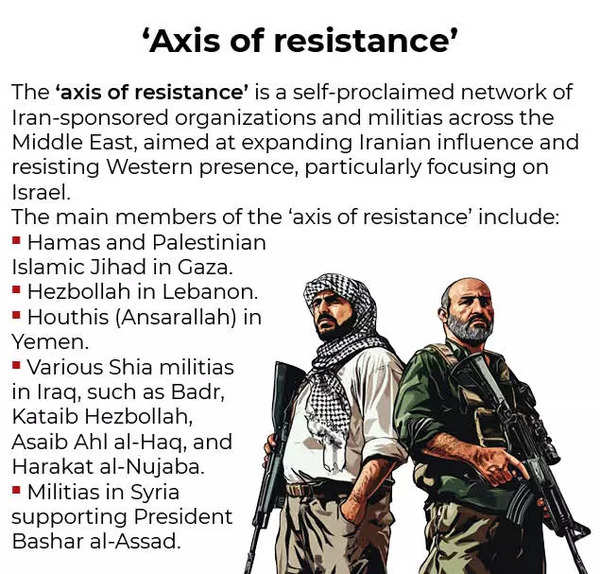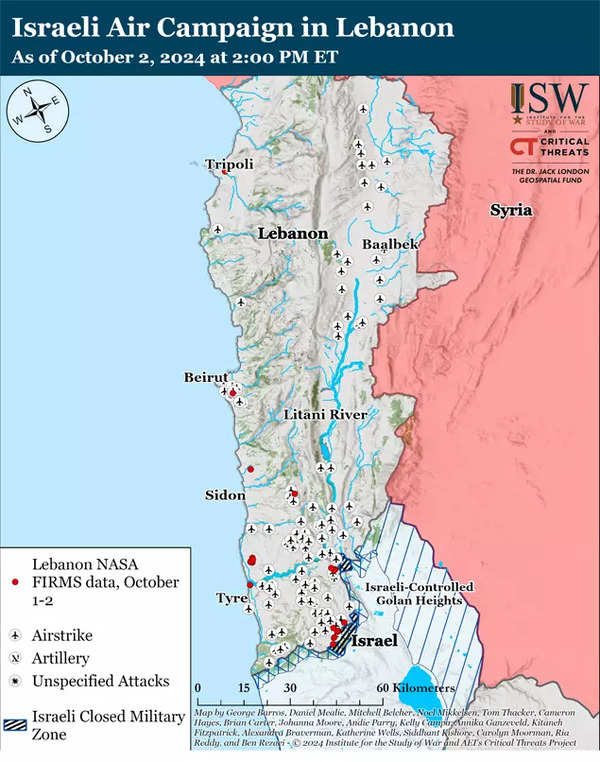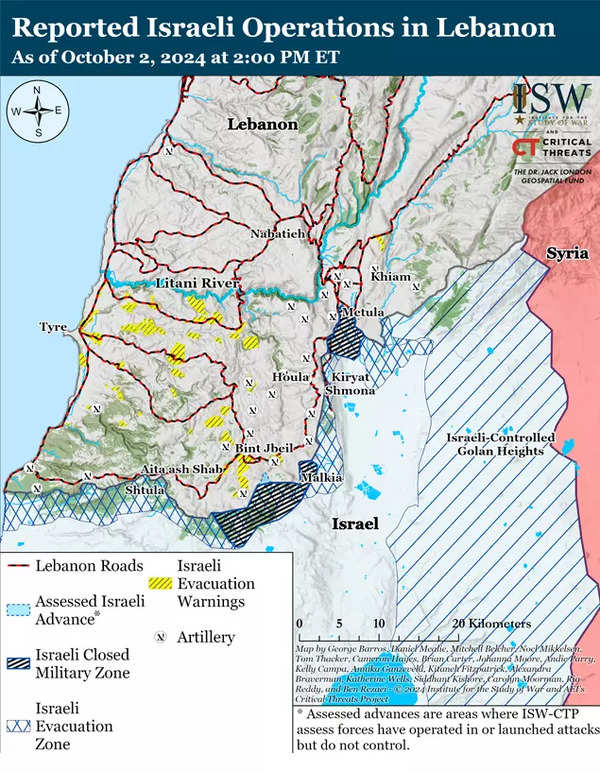
Israel has long considered Iran’s nuclear program an existential threat.(AI image for representation only.)
The prospect of Iran assembling a nuclear bomb is not a question of distant speculation but one of immediate geopolitical concern, especially as tensions flare between Israel and Iran in the wake of high-profile assassinations of Hamas and Hezbollah leaders.
Driving the news
- On October 1, 2024, Iran fired over 200 missiles at Israel in what was seen as a largely symbolic show of force. The missiles were intercepted with little damage, but the strike underscored the escalating tensions between the two nations. Israeli Prime Minister
Benjamin Netanyahu responded swiftly, promising that Iran would “pay for it,” while US President Joe Biden cautioned against an overly aggressive response, urging Israel to act “proportionally.” - This marks the second significant Iranian missile attack this year, following a similar strike in April. Israel, with its advanced missile defense systems, intercepted most of the projectiles, but the psychological and political impact of these attacks is profound.
- Israel now faces the dilemma of how to respond—whether to strike Iran’s nuclear facilities, which could trigger a regional war, or to continue its more restrained approach of targeting Iranian proxies in Lebanon, Syria, and elsewhere.
Why it matters
- Iran’s missile strikes against Israel, following the assassination of key leaders like Hezbollah’s Hassan Nasrallah, signal that Tehran is under significant pressure. The
Axis of Resistance , comprising Iran-backed groups like Hamas and Hezbollah, has suffered crippling blows. Ali Vaez from the International Crisis Group notes that Iran’s missile attacks reflect a series of humiliations at the hands of Israel. Yet, these missile strikes are, at best, symbolic, considering Israel’s robust defense systems. - Iran’s leadership, including Ayatollah Ali Khamenei, is also dealing with a loss of credibility across the region. Losing top allies in Lebanon and Gaza has driven Tehran to retaliate militarily, but with limited success. The missile barrage in April and the recent attack of 200 missiles, intercepted by Israel, have been largely ineffective. Iran, it seems, is playing for survival.
- As a result, the Iranian government’s hardliners might push the regime to take a risky gamble and attempt to assemble nuclear weapons.
- If Iran develops nuclear weapons, it would dramatically shift the balance of power in the Middle East and heighten the risk of a large-scale war.
- Israel, which has long expressed concerns about Iran’s nuclear program, would face an unprecedented threat on its borders.
- The situation also has global implications, as countries like the US and its allies could be drawn into a broader conflict, especially given their longstanding commitments to Israel’s security.

Zoom in
- Israel has long considered Iran’s nuclear program as an existential threat. Should it feel that Iran is on the brink of developing a bomb, it may feel compelled to act—potentially by launching airstrikes on Iranian nuclear facilities. The risks of such a move are high, however. Iran has dispersed its nuclear infrastructure across the country, with key facilities deeply buried, making a successful strike difficult and requiring extensive military coordination.
- Further complicating matters, Israel is already fighting on two fronts: in Gaza against Hamas, and in southern Lebanon against Hezbollah. Opening a third front with Iran could stretch Israeli military resources and increase the risk of Hezbollah launching a more aggressive counterattack from Lebanon.


How quickly can Iran assemble a nuclear bomb?
- Iran’s nuclear program has been a point of international tension for decades, but its progress has accelerated following the collapse of the 2015 nuclear deal (JCPOA). Since the US withdrew from the agreement in 2018, Iran has gradually ramped up its
uranium enrichment , reducing the so-called “breakout time”—the period needed to produce enough fissile material for a bomb. According to various reports, this breakout time is now estimated to be just a few months, may be even a few weeks. - Iranian officials insist that their program is peaceful, but the uranium enrichment levels suggest otherwise. Enrichment beyond 60%—well above the JCPOA limits—suggests the potential to create weapons-grade uranium at 90%.
- Iran’s nuclear program has advanced to a point where the “breakout time”—the time needed to enrich enough weapons-grade uranium for one bomb—has been reduced to mere weeks, according to some reports. “Iran can now ironically break out quickly, in days, using only its deeply buried Fordow facility,” claimed a report published in August by the Institute for Science and International Security, a private organization based in Washington.
- However, according to a New York Times article, some nuclear experts think that Iran would require months, possibly up to a year, to develop a nuclear weapon, rather than just weeks.
- Dr Houston G Wood, a retired professor of mechanical and aerospace engineering at the University of Virginia and an expert in atomic centrifuges and nuclear issues, told the NYT: “I don’t think there’s a danger that Iran this year is going to start exploding nuclear weapons.”
- “It would likely take many months,” said Siegfried S Hecker, a former director of the Los Alamos weapons laboratory in New Mexico, “not weeks.”
- However, producing a nuclear weapon involves more than just enriching uranium. Iran would still need to develop the technology to design, test, and deploy a nuclear device. Experts suggest that while Iran may have enough material for a bomb soon, the full weaponization process, including building a deliverable warhead, could take a year or more.
What they are saying
- Some experts argue that Iran’s leadership, while seeking nuclear capability as leverage, may be cautious about rushing to complete a weapon due to the potential international fallout. “I don’t think Iran wants a big regional war,” Jon Alterman, a Middle East expert at the Center for Strategic and International Studies (CSIS), told AFP. However, with its alliances and proxy groups across the region weakened by Israeli strikes, Iran may feel that the nuclear option is one of its few remaining cards to play.
- Ali Vaez, an analyst at the International Crisis Group, told AFP that “failing to respond to these Israeli blows might erode Iran’s credibility with its allies, but moving too fast on the nuclear front could provoke a military intervention by Israel or the US.”
Between the lines
- Tehran is likely aware that openly developing a nuclear weapon would risk preemptive strikes from Israel or even US-led coalitions. Still, the possibility of using its nuclear progress as a bargaining chip to secure economic and political concessions cannot be ruled out.
- Moreover, Israeli air defenses, including the Iron Dome and David’s Sling, have intercepted most Iranian missile attacks, keeping direct damage relatively low. K Campbell, a US military intelligence veteran, told AFP that “Iran seems to be deliberately staying below the Israeli air defense saturation point.” This hints that Iran is aiming to send political messages rather than inflict mass casualties, signaling restraint while still flexing its military muscles.
What’s next
- The United States, under President Joe Biden, has walked a fine line between supporting Israel’s right to self-defense and preventing a broader regional war. In response to Iran’s latest missile attack, Biden emphasized the need for a “proportional” response, firmly rejecting any potential Israeli strike on Iran’s nuclear facilities. “The answer is no,” Biden said when asked if he would back an Israeli strike on Tehran’s nuclear sites.
- Washington is aware that a strike on Iran’s nuclear infrastructure would trigger a broader conflict that could draw in global powers. US secretary of state Antony Blinken has been in constant communication with European allies, warning Israel against escalating the conflict into a full-blown regional war. The international community is anxious to prevent a new wave of instability, particularly given the strained global energy markets. Iran, as a key oil producer, has the capacity to disrupt the flow of crude oil, sending shockwaves through global economies.
- Despite Biden’s objections, Israel may ultimately take matters into its own hands, particularly if Iran’s nuclear program edges closer to a weapon. Some analysts predict that Israel could launch a surgical strike, but the risks are monumental. Iran’s facilities are not only spread across various sites, but many are also fortified deep underground, complicating efforts to neutralize them in a single strike.
- Ultimately, the question of how quickly Iran can assemble a nuclear bomb looms large over the region, especially with the Israel-Iran conflict simmering. While Tehran appears far from producing a fully operational weapon, the timeline is narrowing dangerously. Iran’s enrichment program puts it at the cusp of breakout capability, and in the charged atmosphere of the Middle East, the next few weeks or months could bring about a tipping point.
(With inputs from agencies)




